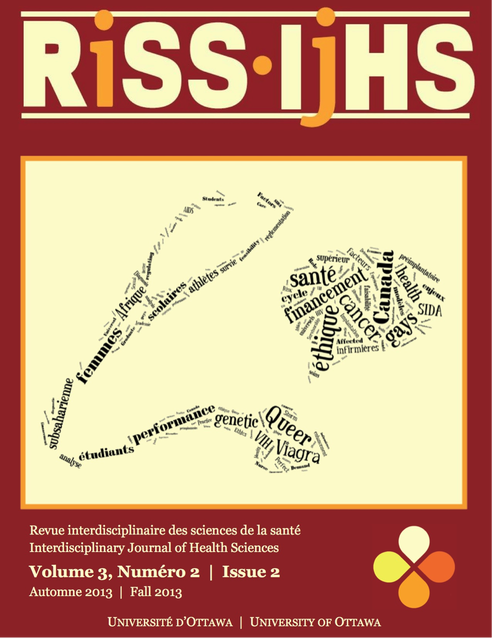Queers in the Classroom: The Role of Sexual Identity in the Academic Experiences of Gay Male Graduate Students
DOI :
https://doi.org/10.18192/riss-ijhs.v3i2.1341Mots-clés :
Hommes homosexuels, identité sexuelle, école des études supérieures, étudiants du cycle supérieur, expérience scolaireRésumé
Les expériences de trois étudiants masculins du cycle supérieur qui s’identifient comme homosexuels ont été explorées afin de comprendre le rôle que l'orientation sexuelle jouait dans leur vie scolaire. Grâce à des entretiens semi-structurés, les participants ont pu partager leurs expériences en tant qu’étudiants masculins gays du cycle supérieur, et les effets sur leur expérience éducative. Une approche modifiée basée sur la théorie ancrée (« grounded theory ») a servi à l’analyse des entretiens retranscrits. Trois thèmes principaux s’en sont dégagés : a) le choix de divulguer son identité sexuelle en milieu scolaire ; b) les défis rencontrés dans le cadre des interactions avec les pairs ; et c) les avantages d’être un étudiant masculin gay au cycle supérieur. Les résultats suggèrent que la gestion et l'expression de son identité sexuelle sont des processus importants qui interagissent avec plusieurs aspects de la vie des étudiants homosexuels masculins.
Références
Charmaz, K. (2006). Coding in grounded theory practice. In K. Charmaz, Constructing Grounded Theory: A Practical Guide Through Qualitative Analysis (pp. 42-71). Thousand Oaks, CA: Sage.
Chur-Hansen, A. (2004). Experience of being gay, lesbian or bisexual at an Australian medical school: A qualitative study. International Journal of Inclusive Education, 8 (3), 281-291. http://dx.doi.org/10.1080/1360311032000160607
Cotten-Huston, A.L., & Waite, B.M. (2000). Antihomosexual attitudes in college students: Predictors and classroom involvement. Journal of Homosexuality, 38 (3), 117-133. http://dx.doi.org/10.1300/J082v38n03_07
Crouch, M. & McKenzie, H. (2006). The logic of small samples in interview-based qualitative research. Social Science Information, 45, 483-499. http://dx.doi.org/10.1177/0539018406069584
D’Augelli, A.R. (1992). Lesbian and gay male undergraduates’ experiences of harassment and fear on campus. Journal of Interpersonal Violence, 7 (3), 383-395. http://dx.doi.org/10.1177/088626092007003007
Herek, G. (1993). Documenting prejudice against lesbians and gay men on campus. Journal of Homosexuality, 25 (4), 15-30. http://dx.doi.org/10.1300/J082v25n04_02
Jewell, L.M., & Morrison, M.A. (2010). “But there’s a million jokes about everybody...”: Prevalence of, and reasons for, directing negative behaviours toward gay men on a Canadian university campus. Journal of Interpersonal Violence, 25 (11), 2094-2112. http://dx.doi.org/10.1177/0886260509354499
Korfhage, B.A. (2006). Psychology graduate students’ attitudes toward lesbians and gay men. Journal of Homosexuality, 51 (4), 145-159. http://dx.doi.org/10.1300/J082v51n04_08
Lambert, E.G., Ventura, L.A., Hall, D.E., & Cluse-Tolar, T. (2006). College students’ views on gay and lesbian issues: Does education make a difference? Journal of Homosexuality, 50 (4), 1-30. http://dx.doi.org/10.1300/J082v50n04_01
Longerbeam, S.D., Inkelas, K.K., Johnson, D.R., & Lee, Z.S. (2007). Lesbian, gay, and bisexual college student experiences: An exploratory study. Journal of College Student Development, 48 (2), 215-230. http://dx.doi.org/10.1353/csd.2007.0017
Lopez, G., & Chism, N. (1993). Classroom concerns of gay and lesbian students: The invisible minority. College Teaching, 41 (3), 97-103. http://dx.doi.org/10.1080/87567555.1993.9926788
MacDougall, C., & Fudge, E. (2001). Planning and recruiting the sample for focus groups and in-depth interviews. Qualitative Health Research, 11, 117-126. http://dx.doi.org/10.1177/104973201129118975
Marshall, C., & Rossman, G. B. (2011). Managing, analyzing, and interpreting data. In C. Marshall & G. B. Rossman, Designing Qualitative Research (5th Edition) (pp. 205- 227). Thousand Oaks, CA: Sage.
Maxwell, J. A. (1998). Designing a qualitative study. In L. Bickman & D. J. Rog (Eds.), Handbook of Applied Social Research Methods (pp.69-100). Thousand Oaks, CA: Sage.
Newman, B. S., Dannenfelser, P. L., & Benishek, L. (2002). Assessing beginning social work and counselling students’ acceptance of lesbians and gay men. Journal of Social Work Education, 38 (2), 273-288.
Rainey, S., & Trusty, J. (2007). Attitudes of Master’s level- counselling students toward gay men and lesbians. Counselling and Values, 52, 12-24. http://dx.doi.org/10.1002/j.2161-007X.2007.tb00084.x
Rankin, S. A. (2005). Campus climates for sexual minorities. New Directions for Student Services, 111, 17-23. http://dx.doi.org/10.1002/ss.170
Rubin, H. J., & Rubin, I. S. (1995). Assembling the parts: Structuring a qualitative Interview. In Qualitative Interviewing: The Art of Hearing Data (pp. 145-167). Thousand Oaks, CA: Sage.
Stevens Jr., R. A. (2004). Understanding gay identity development within the college environment. Journal of College Student Development, 45 (2), 185-206. http://dx.doi.org/10.1353/csd.2004.0028
Stotzer, R. L. (2009). Straight allies: Supportive attitudes toward lesbians, gay men, and bisexuals in a college sample. Sex Roles, 60, 67-80. http://dx.doi.org/10.1007/s11199-008-9508-1
Strauss, A., & Corbin, J. (1998). Basics of qualitative research: Grounded theory: Techniques and procedures for developing grounded theory (2nd ed.). Thousand Oaks, CA: Sage.
Swank, E., & Raiz, S. (2010). Attitudes toward gays and lesbians among undergraduate social work students. Journal of Women and Social Work, 25 (1), 19-29. http://dx.doi.org/10.1177/0886109909356058
van Heugten, K. (2004). Managing insider research: Learning from experience. Qualitative Social Work, 3 (2), 203- 219. http://dx.doi.org/10.1177/1473325004043386
Téléchargements
Publié-e
Numéro
Rubrique
Licence
- Tous les auteurs dont l’article est publié dans la RISS en conserveront les droits.
- Les auteurs accordent à la RISS le droit d’être la première à publier les articles qui lui sont soumis.
- Tous les articles publiés dans la RISS sont autorisés en vertu d’une licence Creative Commons Attribution à être circulé si les auteurs et la revue de la publication originale sont reconnus.
- La RISS est publiée en ligne et imprimée. La RISS n’est pas responsable de l’utilisation non autorisée du contenu publié sous forme électronique ou imprimée.
- La RISS retient les droits de distribution de tout le contenu.
- Les auteurs, et non la RISS, sont responsables d’avoir obtenu les permissions nécessaires concernant les travaux cités.


